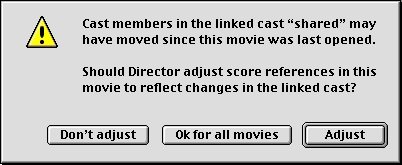Is anything really "OK for All Movies?"
February 9, 2000
by Steve Kury
How many of you have seen strange alerts in Director that have no ready explanation? I have seen quite a few myself, and having been part of the Director engineering team I have had exposure to some odd ones.
One that I will address here, and it occurs fairly commonly, is the one that appears when you open a movie that utilizes a shared cast with at least one of its members moved while you were working in another movie. Here is a screen shot of it since it is hard to describe succinctly, and doesn't have a formal name, at least that I am aware of:

The buttons on the left and right may seem obvious, but will explain them for those who aren't familiar with them.
Adjust: This button will adjust the movie's score references to the cast members that have been moved in another movie. A reason to hit this button would be that you intentionally have cleaned up a shared cast and you want this movie to relink to the cast members.
Don't adjust: This button will have the movie play without adjusting the score references to its cast members that have been moved to other slots. If the linked to cast slots are now empty, the sprite will have no member reference. Reasons to hit this button include:
- You have removed a cast member from the score and plan to delete the score references to it.
- You have intentionally moved or deleted a cast member and you plan to import a new cast member into that spot in the cast to be linked to the sprite on stage.
- You have not intentionally changed the shared cast, so you don't want your score to adjust to the inadvertent change. You plan to track down the cast change and fix it.
Now that we know what they do, what does the button in the middle, "Ok for all movies," do? Is that "Adjust for all movies"? Can it change score references in movies that aren't even open? Nope. Here's what it does.
Imagine this scenario, you have 5 movies in your production that utilize the same member(s) of a shared cast. These are movies A, B, C, D, and E, and they segue into each other sequentially. In movie E you move one of the members of the shared cast that is used in sprite 1 of all the movies. (This could be done inadvertantly in the wee hours.) Then you open movie A, with the intent of playing through the sequence, and are confronted with the alert message.
If you click on either the "don't adjust" or "adjust" buttons, the effect will be for that movie only, saved to it, and you will be confronted by the alert when each subsequent movie opens. But, what if you don't want to alter any of the movies and you don't want to see the alert again as you do your dry run through the sequence? You click the center button, the effect will be that of clicking "adjust" for each movie without saving it on each movie. Each movie will be temporarily adjusted for that run through the sequence in that authoring session. And every subsequent time you go through the sequence, in that authoring session, you will not be queried by the alert.
This is an authoring runtime effect only. Each time you launch Director and open movie A you will encounter this alert because "OK for all movies" does not alter the movies permanently, it sets a temporary condition for that session of Director only.
If you attempt to make a projector out of movie A, and click "Ok for all movies," the projector will not be made because Director cannot compress a movie that has been modified and not saved. Clicking "adjust" or "don't adjust" would be saved to movie A, and have its effect on all the movies in projector playback of the sequence.
To find out things like this one only has to take the time to make some test movies that test the situation, which can be a pain. (Quality Assurance gets paid to do things like this.) But how many of us take the time to do it, or have the time for that matter? Not too many.
So next time you're sitting bleary-eyed after a 16-hour day, staring at this alert message, you'll have the information you need so you can make an informed decision.
Copyright 1997-2026, Director Online. Article content copyright by respective authors.